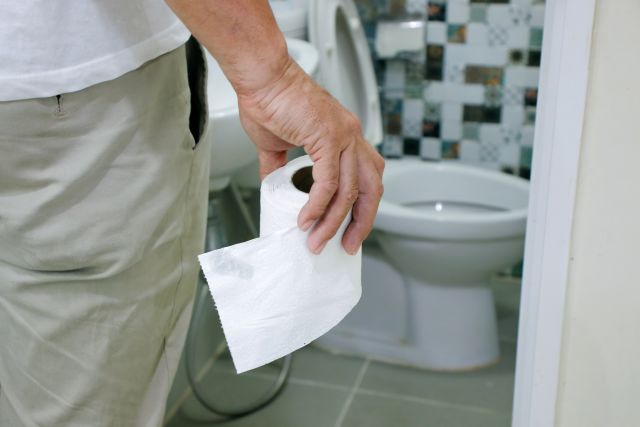Updated on July 19, 2024.
For many people, the color of bowel movements isn’t a popular topic of conversation. Some are even too embarrassed to talk about it with a healthcare provider (HCP). But that could be a dangerous mistake.
Why? A change in stool color might be caused by medication or food. But it can also signal a serious medical condition.
With that in mind, here’s what your poop’s color might say about your health.
Healthy stool colors
The brown color of stool comes from bile salts, says Keith Roach, associate professor in clinical medicine in the division of general medicine at Weill Cornell Medical College and New York Presbyterian Hospital. “Bile is released by the liver and stored in the gallbladder, and then added to the small intestine just after food passes through the stomach. It helps break down food components,” says Dr. Roach.
Healthy feces should be medium or dark brown. But green stool is usually considered okay, too.
Green indicates the presence of biliverdin, which is “an incomplete breakdown of bile salt,” says Roach. That usually means food has gone through the digestive system too fast for bacteria in the intestine to change the bile from green to brown. “A very fast transit time is associated with some laxatives, as well as diarrhea,” says Roach.
Green food coloring, some medications (especially iron supplements), and a diet heavy in leafy greens can also turn your poop green. “Especially kale, because it’s hard for your body to break down,” Roach says.
Other colors, including the following, might indicate a problem.
Black stool
Common causes of black stool include ingesting iron supplements, black licorice, or bismuth in the form of Pepto-Bismol. “At least once a year I have a young adult come in terrified because they have a black stool,” he says. “If they’ve taken Pepto-Bismol lately, it’s usually case closed.”
That said, black poop can indicate bleeding high in the digestive tract, often in the esophagus, stomach, or small intestine. Even a bad nosebleed can cause black stool, says Roach, if you swallow enough blood. Black, tarry stool with blood in it is called melena, he says.
Bottom line? Unless you’ve taken Pepto-Bismol recently and your poo quickly returns to a normal brown color, have black poop checked out.
Red stool
Red food coloring can lead to red stool. So can eating red foods, like beets or cranberries. But outside of these factors, red stool frequently indicates bleeding in the lower part of your digestive system.
- If the blood is bright red, it could be from anal fissures or hemorrhoids. Hemorrhoids are swollen, inflamed blood vessels. They’re located around the anus and rectum.
- If the blood is darker red, it’s likely coming from the colon, also called the large intestine.
“For colonic bleeding, we think polyps,” says Roach. “Arteriovenous malformation, or AVM, can also do it. AVM is where an artery connects directly to a vein. The structure is delicate and fragile, and when a stool passes by it, it could cause bleeding.”
Any blood in the stool should be checked by an HCP. In some cases, such as hemorrhoids, there may be treatments you can do at home. But in other situations, you may need medication, tests, or exams to determine what’s going on.
Yellow stool
Yellow poop can be caused by changes in your diet. But if stool is yellow, looks greasy, and smells particularly bad, it’s commonly a problem with fat absorption. “That usually means the pancreas isn’t working properly,” Roach says. “The pancreas makes an enzyme called lipase, which breaks down fat in the gut. Without that, fat comes out in your stool and when you can’t absorb fat, you lose weight to the point of malnutrition.”
Yellow bowel movements may also be a sign of celiac disease. It’s an autoimmune disorder in which eating gluten causes the immune system to attack the small intestine, interfering with the absorption of nutrients. Gluten is found in grains such as wheat, rye, and barley. If you’re diagnosed with celiac disease, “get on a good gluten-free diet and it will take care of the stools,” says Roach.
White or clay-colored stool
Sometimes very pale stool is caused by anti-diarrheal medicine. But if you haven’t taken any and your poop is white or chalky, visit an HCP as soon as possible. White stool indicates there’s no bile salt in the bowel movement. “That means there’s a blockage that is not letting the bile out,” Roach says.
Bile must pass through various ducts in its journey from the liver to the gallbladder to the small intestine. Any one of those ducts could get blocked. Gallstones, cancer of the bile duct, and cancer of the pancreas are potential causes. It’s good reason to seek care right away.







